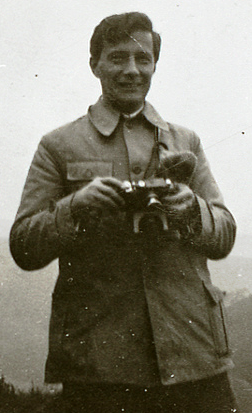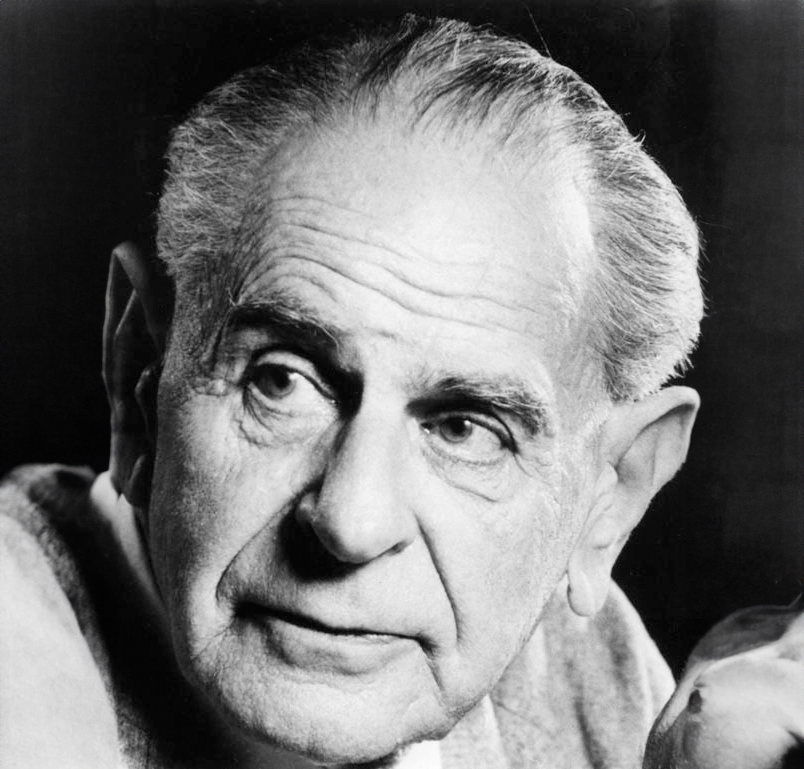Ute Deichmann, Director of the Jacques Loeb Centre for the History and Philosophy of Science at the Ben-Gurion University of the Negev, discusses two prominent 20th-century philosophers and their distinctive but equally significant approaches to science
Karl Popper and Michael Polanyi shared important aspects of their biographies. Originating from intellectual circles in the Austrian-Hungarian monarchy (Vienna and Budapest) around 1900, they were expelled from their positions in Austria and Germany during the Nazi era as Jews and finally settled in the UK. Similarities can be found in their resentment of communism and their convictions that personal freedom is essential for the conduct of science. However, their philosophies concerning science differ widely.
Karl Popper
The Austrian-British philosopher Karl Popper (1902-1994), arguably the most influential philosopher of science, especially of the social sciences, of the 20th century, most forcefully formulated the hypothetical-deductive method, which placed hypothesis testing in the centre of the scientific method (William Whewell partly anticipated it). Popper’s main work in the philosophy of science, The Logic of Scientific Discovery (1959), is well known; therefore, I summarize it only briefly. According to Popper, a scientist constructs hypotheses or systems of theories and critically tests them against experience by observation and experiment. The riskier a prediction is, the more significant the test of the hypothesis. This does not follow inductive logic. Popper rejected induction as a way to test hypotheses because he perceived an asymmetry between confirmation and falsification.
No finite set of observations, for example, of white swans, can prove the statement that all swans are white. Dismissing the accumulation of more and more perceptual experiences as the basis for the advancement of science, he contradicted Bacon: ‘Bold ideas, unjustified anticipations, and speculative thought are our only means for interpreting nature: our only organon, our only instrument for grasping her.’ He held that not only truth could not be achieved in such a way, but also that probability is impossible: ‘I never assume that by force of ‘verified’ conclusions, theories can be established as ‘true,’ or even as merely ‘probable.’’ In contrast, theories can be falsified by a single piece of contradictory evidence. Falsifiability, that is, the inherent possibility that a hypothesis can be proven false, is at the center of Popper’s scientific methodology. Theories can only be refuted, not confirmed. A theory that has been falsified must be rejected.

Michael Polanyi
Michael Polanyi (1891-1976) started to publish about science shortly after the Second World War after a successful career as a physical chemist in Berlin and, after his forced emigration from Nazi Germany, in Manchester. His most important works in the philosophy of science are Science, Faith, and Society (1946), Personal Knowledge – Towards a Post-critical Philosophy (1958), and The Tacit Dimension (1964).
Unlike other philosophers, who proposed principles for theory appraisal, e.g., falsifiability, simplicity, generality, and emphasized the importance of scepticism, Polanyi stressed the personal aspects of science, considering science as a social system based on competence, epistemic authority, and apprenticeship. For him, practice was the primary objective. According to him, scientists are not driven by doubt but by a commitment to established beliefs. Students acquire skills and knowledge by learning from example, and in order to do so, they have to submit to authority. A great scientist is someone who is competent. A stable belief system and an interpretive framework or ‘paradigm’ play major roles in scientific practice. Thomas Kuhn later took up this idea in his description of ‘normal science,’ where he popularized the term ‘paradigm’. But, unlike Kuhn, Polanyi believed science would progress and he was convinced that science results in true knowledge. Likewise, Polanyi anticipated Kuhn’s idea of ‘incommensurability’: He believed that major discoveries could change the interpretative frameworks, and scientists working in different ones could sometimes face a ‘logical gap.’ Again, unlike Kuhn, Polanyi showed that the ‘gap’ could be resolved in the course of scientific progress, for example, in the late-nineteenth-century controversy about the nature of alcoholic fermentation between Pasteur, who believed fermentation was brought about by organisms and chemists such as Liebig who believed it was a purely chemical process. The controversy was resolved by the discovery of intracellular enzymes by Eduard Buchner (Polanyi [1958] 1962, 150-7).
During the 1930s and 1940s, Polanyi became increasingly involved in discussions about politics and economics, particularly about communism. A substantial number of British academics were Marxists. During a lecture tour in the USSR in 1935, a meeting with the leading Marxist theoretician Nikolai I. Bukharin deeply disturbed Polanyi. He recalled that ‘to claim independent status for pure science was ridiculed as mere snobbery’ and that, according to Bukharin, ‘pure science, as distinct from technology, can exist only in a class society.’ Later, Polanyi described the absurdity of such claims in the following words: ‘To declare that in a classless society, the pursuit of science – the search marked by the names of Copernicus and Newton, Harvey, Darwin, and Einstein – will spontaneously turn to the advancement of the next Five-Year Plan is simply ludicrous’ (ibid., 253). In the late 1930s and then, in particular, in 1948, these maxims turned into a battle against ‘bourgeois science,’ culminating in Lysenko’s campaign against Mendelism. Polanyi wrote numerous articles about the negative effects of the social control of science.
Popper, Polanyi, and their importance for present-day science
Polanyi’s views on scientific practice strongly contrasted with those of Popper, who did not deal with the actual processes that led to discovery. They were looking at science from very different perspectives. Popper’s interest was in evaluating scientific theories. He made it clear that a philosopher is not interested in the initial stage of a discovery, the act of conceiving or inventing a theory, because it ‘seems to me neither to call for logical analysis nor to be susceptible of it’ (1959). In contrast, Polanyi attributed great importance to scientific practice and to how theories were created. He made it clear that rules and principles alone – though important – would not enable anyone who was lacking the training and skills of a scientist to make any competent judgment.
In contrast to Popper, who focussed on the testing of bold hypotheses and revolutionary changes, Polanyi was of the opinion that far-reaching discoveries do not necessarily have to overturn an established framework and that progress was brought about mostly by discoveries within established scientific frameworks. Polanyi, despite anticipating Kuhn’s concept of ‘normal science,’ would not have accepted Kuhn’s distinction between normal science as aimed at puzzle solving and scientific revolutions that change whole scientific frameworks. According to Polanyi, ‘true innovations’ do not have to include a ‘revolutionary change by which the whole framework of science is reformed.’ Newton’s ideas ‘were widely current in his time; his work did not shock any strong beliefs held by scientists,… One of the …most surprising discoveries of our own age, that of the diffraction of X-rays by crystals (in 1912) was made by a mathematician, Max von Laue, by the sheer power of believing more concretely than anyone else in the accepted theories of crystals and X-rays. These advances were no less bold and hazardous than were the innovations of Copernicus, Planck, or Einstein’ ([1958] 1962, 276).
To him, the fact that scientific judgment, to a large extent, rested on tradition did not contradict ‘the appearance of true originality. For [the conformity to tradition] certainly does allow it: science presents a panorama of surprising developments.’ The surprising confirmations of novel discoveries, such as Mendel’s principles of heredity, confirm the ‘paradigm of all progress in science: discoveries are made by pursuing possibilities suggested by existing knowledge.’ According to Polanyi, this applies also to radically novel discoveries. Thus, ‘all the material on which Max Planck founded his quantum theory in 1900 was open to inspection by all other physicists. He alone saw inscribed in it a new order that could transform the outlook of man’, a discovery which, according to Polanyi, was more ‘solitary’ than even Einstein’s.
With science today being increasingly influenced by the availability of big data and AI techniques, it is important to heed both Popper and Polanyi. They provide the necessary answers to claims such as that the volume of data enables data to speak for themselves free from theory or that science has to be freed from the requirement of a causal description. Popper’s epistemology of hypothesis testing has proved fruitful – in modified versions – not only for 20th-century molecular biology but also for 21st-century systems biology. The marginalization of hypotheses and their experimental testing, so strongly emphasized by Popper, in big-data-driven research, foregoes the search for mechanisms or causes. Computer scientists Judea Pearl and Dana Mackenzie (2018) point to the importance of Polanyi when they emphasize that unlike in big data-driven correlations, ‘causal analysis requires the user to make a subjective commitment […] Where causation is concerned, a grain of wise subjectivity tells us more about the real world than any amount of objectivity; … data alone cannot make up for lack of scientific knowledge.” Popper and Polanyi remind us that science is more than a correlation of data. Scientific knowledge is important to explain natural phenomena, their mechanisms, and their causes. They remind us that science is a culture where communities have the obligation to convey their knowledge to the younger generation and the freedom to criticize established views.
References
- Pearl, Judea and Mackenzie, Dana. 2018. The Book of Why. The New Science of Cause and Effect. New York: Basic Books.
- Polanyi, Michael. [1958] 1962. Personal Knowledge – Towards a Post-Critical Philosophy. Chicago: University of Chicago Press.
- Popper, Karl. 1959. The Logic of Scientific Discovery. London: Hutchinson and Co.

This work is licensed under Creative Commons Attribution-NonCommercial-NoDerivatives 4.0 International.


